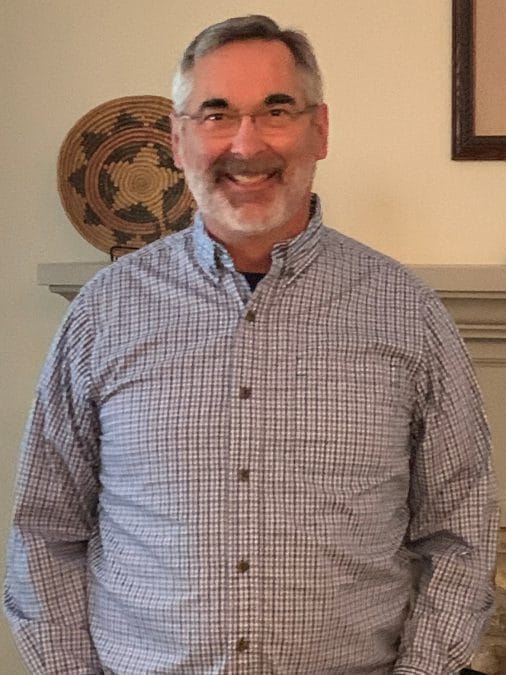History books often overlook Native American involvement in the military and their roles in protecting the United States’ sovereignty. This inspired Citizen Potawatomi Nation tribal member and middle school teacher Bret Godfrey to apply for a prestigious Fund for Teachers grant. His proposal includes bringing to light this often undiscussed part of American history through research and first-hand experience.
Godfrey teaches seventh and eighth grade history and geography at the American Indian Magnet School in St. Paul, Minnesota. With the significant fellowship, Godfrey will travel to Europe and study Native American’s service during World War II and add his findings to his curriculum.

inclusive history of Native American service during World War II. (Photo provided)
“It certainly goes back to being an American Indian magnet school. You’re trying to find relevant material for our students, and there isn’t much in the books beyond the Code Talkers,” Godfrey said.
While he believes the Code Talkers play an important role in American history, Godfrey wants to uncover personal, deeper stories and highlight the tradition of service that so many Native Americans continue today. He also hopes to pay homage to those who never made it home, many of whom were not even U.S. citizens at the time.
“Why is it that Native Americans are more representative in the military per capita than any other groups?” Godfrey asked. “I think one of the themes that came out was, we lost our country, and we don’t want to lose it again. And it’s part of protecting your land and protecting your country — your homeland. Part of our traditions is being warriors.”
The grant
Donor-supported Fund for Teachers awards fellowships to educational professionals leading pre-K through 12th grade students. The teachers must have more than three years of classroom experience and seek to expand professional development to enrich their classroom, school and community’s success. While many apply, the organization has selected only 9,000 educators nationwide since its incorporation in 2001.
“My wife received a Fund for Teachers grant, and she was pushing me. ‘You need to do this and sit down and hammer it out,’” Godfrey said.
The two, along with friends and family — including their daughter Virginia Vogel and Godfrey’s uncle, George Godfrey, who is a published author — worked on crafting the application and editing it to perfection.
Godfrey’s grant request included visiting well-known World War II cemeteries in Normandy as well as others across Europe.
“I don’t want to sound morbid, but I find cemeteries interesting. You go in there, you see history just by looking at a tombstone,” he said.
While the Hownikan spoke with Godfrey through Zoom, his wife Debra highlighted the trauma involved when remains never make their way back home for families and communities to mourn and hold proper ceremony. Part of the trip includes honoring Native American soldiers by smudging and offering tobacco.
“It would be great to bless Potawatomi, if we find those graves,” Godfrey said.
Overall, he is passionate about putting pieces together, keeping stories alive for future generations and reminding his students of the long-standing traditions within tribes to serve others.
“You’ve got the macro-type stories of the Battle of the Bulge in Normandy, and you got the story that we all pretty much learned in history,” he said. “But, as you dig down deeper, there’s that personal story — individual stories and families and tribal communities that really aren’t told. And for a tribal community, we’re a small community, that type of story should be told.”
The American Indian Magnet School’s students represent a variety of tribes.
“It’s a good place for me to be,” he said, and the grant will assist with reaching students both Native and non-Native alike.
Pandemic disrupts plans
Godfrey received notification of his Fund for Teachers award around the coronavirus pandemic’s onset in the United States. This disrupted his ability to travel to Europe and conduct research over the 2020 summer.
“You’re trying to keep pumped up about it and stay enthusiastic, then your hopes get dashed,” Godfrey said. “So that’s an emotional piece that a person has to work through.”
However, he sees the delay as an opportunity to dive deeper into his studies and focus time on adapting to virtual instruction.
“It’s nothing profound in what I am saying — it’s across the board. (All teachers) are struggling with trying to keep our students engaged,” he said.
“I don’t want to get good at (teaching virtually). I want to get back into the classroom and be around the students.”
How to help
Once coronavirus traveling restrictions are no longer in place, Godfrey will visit Europe and complete the fellowship. While he knows of other Native Americans who never made it home, he would like to learn more about Potawatomi servicemen and women buried in Europe due to the war.
“We want to honor them when we end up there,” he said. “The cemeteries don’t (organize the graves) by rank or race. You just have to go there and study to find out who these people are.
“If someone wants to reach out to me, we would love to have that piece of information.”
Godfrey welcomes communication through email at bret.godfrey@spps.org.
Learn more about Fund for Teachers at fundforteachers.org.
